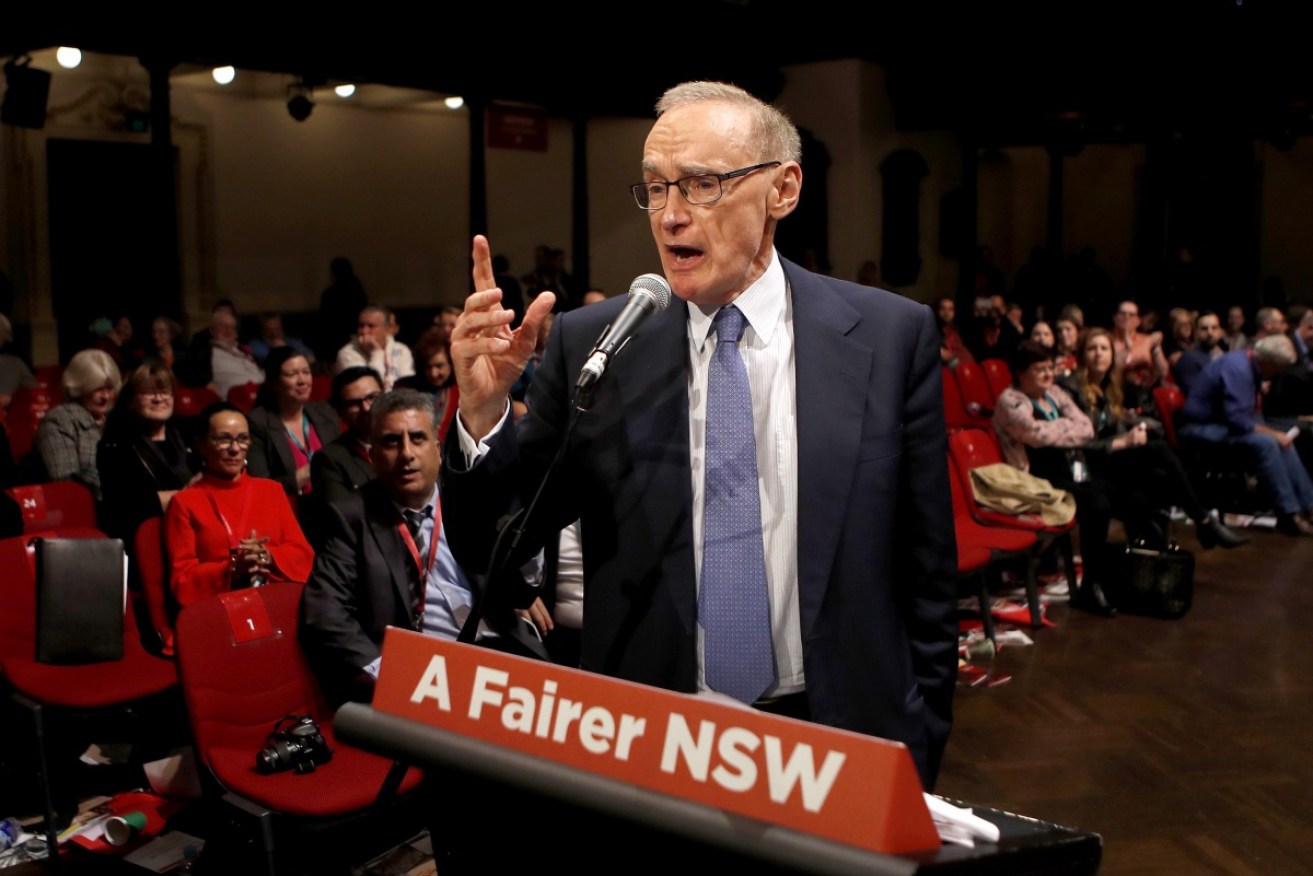Australia builds an ‘Orwellian’ sledge hammer to crack down on foreign influence – and a lot more too


Former foreign minister Bob Carr says the transparency legislation is "clearly a gross over-reach". Photo: AAP
New laws to protect Australia’s democratic governance and economy are about to be determined, now with heightened fear about Chinese influence.
Draft bills before federal parliament cover electoral funding, cyber security and espionage and a new enforceable regime of self-registration for transparency of foreign influence.
ASIO director-general Duncan Lewis has told Parliament of the urgent need for new offences to enable prosecutions for covert activities which put Australia’s intellectual property, scientific and technological research and defence secrets at risk at the click of a mouse from foreign agents and their paid informants.
“Hostile foreign spies are currently conducting harmful activity against Australia on an unprecedented scale,” Mr Lewis said.
But while there is cross-party support for more aggressive detection of covert harm and a total ban on foreigners donating to political parties and candidates, there are complaints about glaring business-linked loopholes.
And civil society, foreign aid, cultural, humanitarian, sporting, artistic and academic groups and lawyers – including the Human Rights Law Centre, the Law Council, the Human Rights Council and Australian Lawyers for Human Rights – have complained the “influence package” is so broad and undefined that it could criminalise harmless foreign communication for a now multi-ethnic Australia.
“The Foreign Influence Transparency Bill might require more than half the country to register to avoid a risk of criminal penalties,” the ALHR’s Dr Tamsin Clarke told The New Daily.
“It is beyond Orwellian. It has the potential to criminalise non-harmful discussions involving an undefined so called ‘foreign principal’, which could be your mother.
“You couldn’t call your mother in New Zealand and tell her you’re going to the demonstration on refugees without registering under this Act. Penalty for not registering, even if you aren’t reckless about your obligations … five years in jail. Penalty if you intentionally don’t register … seven years in jail.
“Even if you don’t engage in the activity the penalty can still be 12 months’ jail.”
Existing anti-money laundering statutes which better defined foreign-risk profiles were preferable. While the Meuller investigation has raised concerns about Russian interference in US politics, here fear centres around China.
A just released book, Silent Invasion by academic Clive Hamilton warns of Chinese Communist Party tactical hegemony through 1.2 million Chinese-Australian citizens, the infiltration of political parties and the collection of intelligence for Chinese agencies.
The book has enraged former prime minister Paul Keating, who is chairman of the international advisory council of the Development Bank of China. Mr Keating has rejected Mr Hamilton’s book as a slur on his loyalty to Australia, arguing that Australia needed to better understand and engage with China through a more independent foreign policy.
This week Andrew Hastie, chairman of the Parliamentary Joint Committee on Intelligence and Security, added to the China fear when he used privilege to name Australia-Chinese billionaire Dr Chau Chak Wing, previously known only as CC-3, the US security code used for an “unindicted co-conspirator” in a major UN bribery case.

Andrew Hastie’s disclosures have stirred up a hornets’ nest. Photo: AAP
The publicity emanating from Mr Hastie’s unilateral disclosure has escalated tensions between Australia and China, with Chinese media editorialising with calls for punitive constraints on Australian exports.
Mr Hastie’s intervention has created a diplomatic headache for Trade Minister Steven Ciobo.
Greens Senator Lee Rhiannon, who has written a dissenting report on election-funding reform, told The New Daily there was a significant loophole in the government’s proposals which would allow Australian subsidiaries of majority foreign-owned corporations to continue political influence here under cover of domestic industry associations such as the Minerals Council of Australia.
“To close the loopholes there needs to be caps on all donations,” she said.
Former foreign minister Bob Carr, while rejecting accusations he has become a mouthpiece for China’s Communist Party government through his UTS Chinese-bankrolled Australia-China Relations Institute, told The New Daily that if the new transparency law was enacted, “Well, I’ll certainly have to self-register.”
This would cover not only his advocacy for Australia’s engagement with China, but his other “foreign” activities.
“Everyone knows I’m trying to influence Labor Party policy to recognise the dispossession of the Palestinians. Of course I’ll have to self-declare.
“I’ve probably taken a packet of dates as a gift or a piece of fretted silverware showing the skyline of Jerusalem pressed upon me by a foreigner.
“This [transparency legislation] is clearly a gross over-reach”, Mr Carr said.
Quentin Dempster is a Walkley Award-winning journalist, author and broadcaster with decades of experience. He is a veteran of the ABC newsroom and has worked with a number of print titles including The Sydney Morning Herald. He was awarded an Order of Australia in 1992 for services to journalism.








